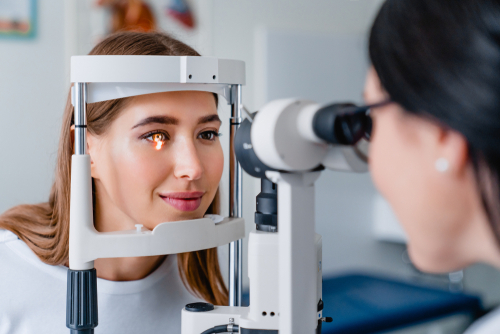What Happens During a LASIK Consultation?
January 26th, 2023
With a life-changing procedure like LASIK, expect a very thorough consultation, including tests and measurements of the eye. A comprehensive eye exam will help map out your vision profile’s unique characteristics and determine if you are a good candidate for the procedure.
Your eye doctor will determine the shape and thickness of your cornea, the size and shape of your pupil, your refractive error, and the overall health of your eyes. They will ask you about your medical history and any medications you are taking.
Your eye doctor will also want to know about your vision goals. By collecting as much information as possible, you and your eye doctor will be able to make the best choice for your vision. Keep reading to learn more about what to expect during a LASIK consultation!
What Tests Should I Expect at a LASIK Consultation?
The tests administered during your LASIK consultation are non-invasive and pain-free. All that will be required are a few eye drops and a moment of gentle pressure on the eye.
Your eye doctor will take measurements using high-powered imaging devices that will capture pictures of your eye. These six tests will help your eye doctor learn all they’ll need to know about your vision and eye health and your unique needs for LASIK surgery.
Ability to Focus
To get an accurate reading of your prescription, your eye doctor will measure your vision in several different ways. You’ve already been through the manual refraction process, in which you peer through a device giving you two different vision options and are asked which lens is better.
In addition to manual refraction testing, digital analyzers will confirm the manual refraction and quality of vision, specifically how light scatters as it enters the eye. By analyzing your eye’s focusing ability and the conditions that affect the quality of vision, your eye doctor will discover how to best correct your vision.
Corneal Evaluation
To obtain detailed data about the curvature, shape, and thickness of the cornea, your eye doctor will use high-definition digital scanners. They capture high-resolution images that are incredibly precise.
With them, your eye doctor can evaluate the cornea, the tear film on the surface of the eye, the health of the eyelids, and detect the early formation of cataracts.
Retinal Evaluation
To evaluate the health and function of the retina, a digital device captures an image. The retina is at the back of the eye and translates light rays coming into the eye into nerve impulses to the brain, which interprets them as what you see.
Tear Film Composition
When you blink, a tear film coats the surface of your eye. A healthy tear film protects the cornea, keeping it healthy.
LASIK reshapes the cornea, so for optimum healing after surgery, it’s important to know that your tear film is sufficient. During your LASIK testing, diagnostic equipment will evaluate your tear film composition and volume.
The goal is to ensure your eyes are in excellent condition before LASIK surgery.
Detailed Screening
Your eye doctor will examine your eyes in detail using a high-powered microscope. This screening can pick up on undiagnosed conditions that can affect the outcome of LASIK. Other tests measure the eyeball and pupil size.
With all this precise, accurate, and essential information, you and your eye doctor can plan for a smooth, straightforward LASIK procedure that offers rapid healing and excellent results. Your LASIK consultation is the beginning of a newfound freedom – your future independence from glasses and contacts.
Are you interested in learning whether or not you may be a candidate for LASIK? Schedule a LASIK consultation at Laser Eye Center in Huntsville, AL, today!



